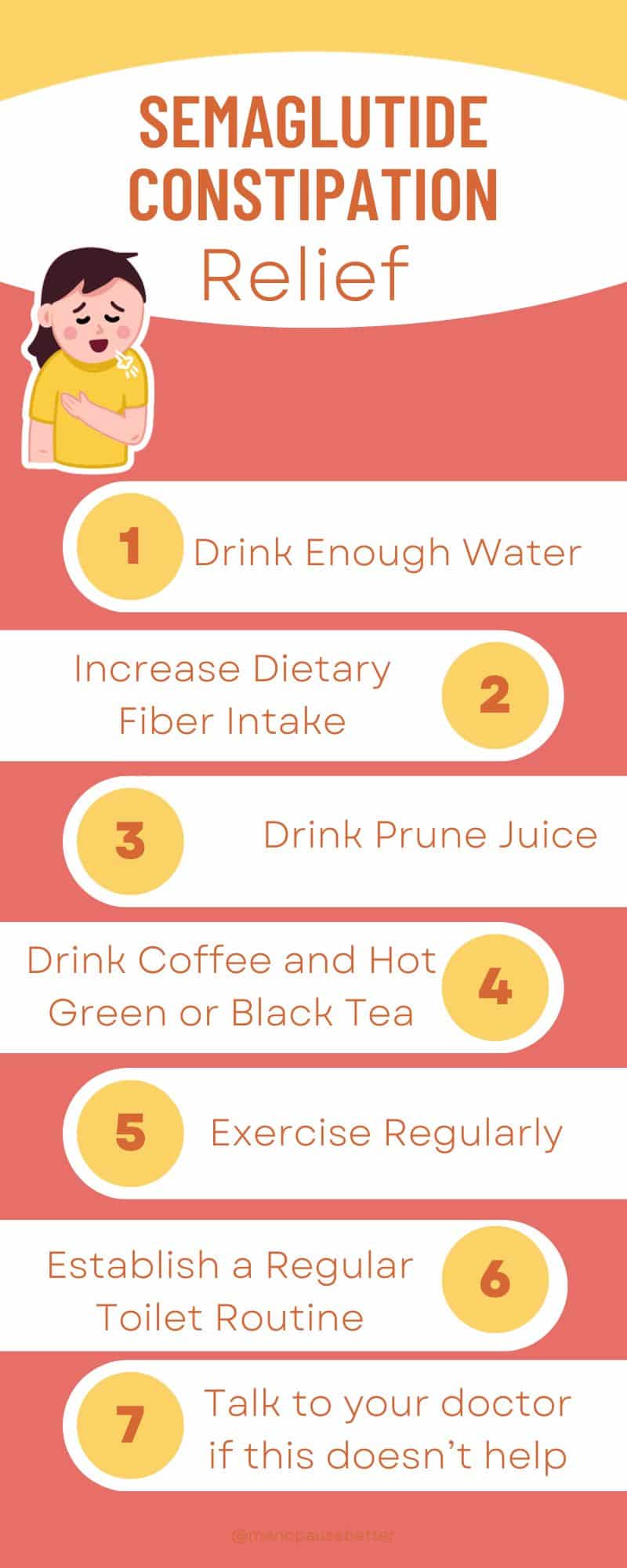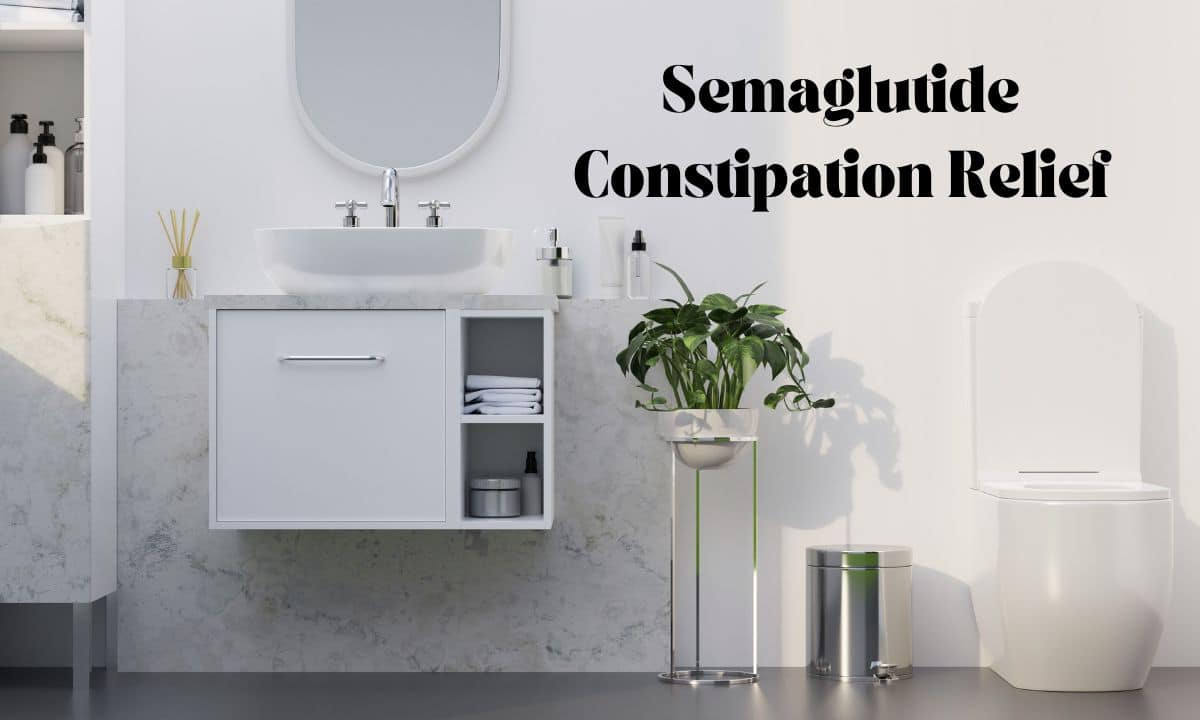Semaglutide Constipation Relief
Semaglutide, the active ingredient in Ozempic® and Wegovy®, has a common side effect that’s noteworthy—constipation.
Table of Contents
ToggleIn clinical trials, it was found that 24% of people taking semaglutide at 2.4mg experienced constipation, while only 11% of those in the placebo group reported the same symptom. It’s worth noting that semaglutide at this dosage is typically prescribed for weight loss under the brand name Wegovy.
Constipation also tends to last longer than other side effects of this medication. It’s also dose-dependent, so it’s not unusual for constipation to increase as the dose escalates.
This blog will explore the causes of constipation while taking semaglutide and some solutions.
What Causes Semaglutide Constipation?
There are a few reasons for constipation while on this medication.
Slow Gastric Emptying
While you’re taking semaglutide, food stays in your stomach for a more extended period of time. This is great for weight loss because you will feel fuller for longer. But, it’s easy to see how this can also cause constipation.
Changes in Eating Habits
This medication can make you feel fuller after meals and affect your appetite. Many people experience a decrease in hunger and an increase in fullness. Changing your eating habits can cause constipation if you eat less and choose different foods than usual.
Decrease in Fiber Intake
Not getting enough fiber in your diet can also cause this symptom. Fiber is important because it helps soften your stool and adds bulk, making it easier to pass through your intestines.
Not Drinking Enough Liquids
Dehydration can often be the cause of constipation. When you don’t drink enough fluids, your body may try to make up for the lack of hydration by extracting water from your stool. This results in dry and hard stools that are difficult to pass.
Water and other liquids help the fiber create a gel-like substance in your gut, making your stools softer and larger. This means that not drinking enough fluids can slow down food movement through your digestive system, leading to constipation.
Dose Escalation and Constipation
Frequently, constipation occurs when there is an increase in the dose of the medication. This happens because the body needs time to adjust to the new dosage. Over time, you will usually adjust to the increased dosage, and the constipation should ease.
Symptoms
Individuals suffering from constipation may experience a range of symptoms, which can vary in severity and duration. Some common signs include:
- Difficulty or straining when passing stools.
- Infrequent bowel movements, such as fewer than three times per week.
- Hard or lumpy stools.
- Feeling as though you can’t completely empty the stool from your rectum.
- Uncomfortable bloating, distension, or cramping in the abdomen.
- Fatigue or general discomfort stemming from irregular bowel movements.
Semaglutide Constipation Relief

To keep yourself regular, it’s essential to stay hydrated, eat plenty of fiber, and stay active. These are the main pillars of a constipation prevention plan.
But that’s not all! There are additional steps you can take to manage and reduce constipation, and we’ll go over those as well.
So, let’s dive in and make your digestive system happy and healthy.
Drink Enough Water
Staying hydrated helps soften stool and prevents the dehydration that can lead to constipation. It also promotes regular bowel movements and keeps food moving through the digestive tract.
The rule of thumb is to drink at least eight glasses of water daily. However, you will need more if you are in a hot climate or participate in exercise.
Increase Dietary Fiber Intake
Eating a high-fiber diet is essential for maintaining regular bowels and keeping a healthy digestion. Foods that are rich in fiber include fruit, vegetables, whole grains, nuts, seeds and legumes.
Moreover, adding soluble fibers like oat bran is also known to soften the stool and make it easier to pass. Foods high in soluble fiber include avocados, apples and sweet potatoes.
Drink Prune Juice
This natural laxative softens stools and stimulates bowel movements thanks to its high sorbitol content. Aim for a glass of prune juice in the morning and another at night to help alleviate constipation. It’s a good idea to start with small quantities and gradually increase them.
Drink Coffee and Hot Green or Black Tea
Did you know that your morning cup of coffee or tea can do more than wake you up?
The heat and properties of coffee and tea can improve digestion and make it easier for digested food to move through your intestines.
But remember, too much caffeine can actually have the opposite effect, so it’s important to consume it in moderation.
Exercise Regularly
Regular physical activity helps stimulate the digestive tract and keep things moving well. Try to get a minimum of 30 minutes of exercise every day.
Establish a Regular Toilet Routine
Try going at the same time every day, even if you don’t feel the urge. This will help get your colon used to eliminating waste regularly.
Over the Counter Medications
There are a few different types of medication that you can buy over the counter (OTC) and that will help with constipation:
Fiber Supplements
These supplements help by increasing the bulk of your stool so that your intestines can push it through your digestive tract efficiently.
Two popular fiber supplements on the market are Benefiber® and Metamucil®.
Stool Softeners
These medications work by increasing the amount of water absorbed by the stool, resulting in a softer consistency for easier and smoother movements.
Colace® and Surfak® are good examples of these types of OTC medications.
Oral Stimulants
Stimulant medications like Dulcolax® and Senokot® induce your intestines to contract and encourage bowel movements.
It’s important to use these medications sparingly, though, because overuse can lead to dependency, which will ultimately make your problem even worse in the long-term.
If you want to learn more about using laxatives, this article by the Mayo Clinic is a great source of information.
Talk to Your Health Care Provider
Consulting with your healthcare provider about improving constipation is invaluable. Because constipation can be medication-related, it’s possible that your dose needs to be adjusted.
Your doctor also has an in-depth understanding of your health status, medical history, and the most suitable treatment approaches. So, if you’re suffering from constipation as a result of taking semaglutide, don’t hesitate to ask for advice.
Other helpful blog posts:
Why You Should Start Using Olive Oil for Constipation

Dr. Su-Nui Escobar, a Registered Dietitian/Nutritionist in Miami, FL, is dedicated to empowering women in perimenopause and menopause to live healthier, more satisfying lives.
With a doctorate in clinical nutrition from the University of North Florida, she has expertise in menopause and weight loss, including the unique challenges faced by those on weight loss medications.
Su-Nui’s passion for her field is evident in her previous role as the Academy of Nutrition and Dietetics spokesperson.


